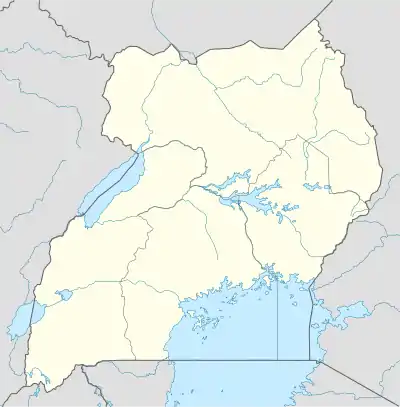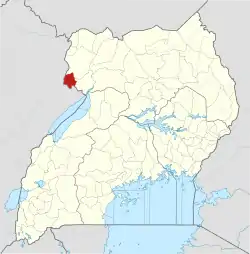Nyagak III Hydroelectric Power Station
Nyagak III Power Station is a 6.6 megawatts (8,900 hp) mini hydroelectric power project, under construction in Uganda, the third-largest economy in the East African Community.[1]
| Nyagak III Power Station | |
|---|---|
 Map of Uganda showing the location of Nyagak III Power Station | |
| Country | Uganda |
| Location | Paidha |
| Coordinates | 02°25′41″N 30°58′24″E |
| Purpose | Electricity generation |
| Status | Under construction |
| Construction began | May 2019 |
| Opening date | 2022 (Expected) |
| Construction cost | US$19.4 million |
| Owner(s) | GenVax Nyagak |
| Operator(s) | Uganda Electricity Generation Company Limited |
| Dam and spillways | |
| Impounds | Nyagak River |
| Reservoir | |
| Normal elevation | 1,380 m (4,530 ft) |
| Nyagak III Hydroelectric Power Station | |
| Coordinates | 02°25′41″N 30°58′24″E |
| Commission date | 2022 (Expected) |
| Type | Run-of-the-river |
| Turbines | 2 |
| Installed capacity | (planned) 6.6 MW (8,900 hp) |
Location
The power station is located across the Nyagak River in Nyapea Sub County, Okoro County, Zombo District, in the West Nile sub-region of the Northern Region of Uganda. This is approximately 15 kilometres (9 mi) north of the town of Paidha, close to the border with the Democratic Republic of the Congo, in close proximity to, but downstream of, the existing Nyagak I Power Station.[2]
Overview
In September 2010, an Environmental Impact Assessment (EIA) was concluded by Lahmeyer International GmbH, a German consulting engineering firm.[3] The Uganda Electricity Generation Company Limited (UEGCL) would develop Nyagak III through a Public Private Partnership (PPP). In 2013, the International Finance Corporation assisted UEGCL to identify and select an investor from the private sector, who would invest equity and arrange further debt and equity financing for the project. That investor would then design, develop, and operate the development under a PPP agreement with UEGCL. This selection process was expected to last approximately one year, beginning in July 2013.[4] The selected private investor is a consortium consisting of Hydromax Limited and Dott Services Limited. UEGCL and the consortium then formed a special purpose vehicle, Genmax Nyagak Limited, that would build, operate, and manage the power station.[2]
Construction timetable
It was anticipated that the selection process for the core investor would last until 2014. Construction would then begin in 2015 and last three years, with commissioning anticipated in 2018.[5][6]
Construction costs
In 2011, the construction of Nyagak III Power Station was anticipated to cost approximately US$14 million.[7] The power generated would be evacuated via the existing 33 kilovolt transmission power lines linking the towns of Paidha, Nebbi, Bondo, Okollo, and Arua, constructed at an estimated cost of UGX:44.2 billion (€13 million) between 2013 and 2015 following the development of the Nyagak Power Station.[8] In March 2018, the Daily Monitor reported that KfW had withdrawn a grant of Shs36 billion (€8 million), towards completion of this project, due to extended delay in reaching financial close. The Uganda government will have to source new funding to bridge he gap.[9]
As of March 2019, the construction costs are reported to be US$19.4 million. Loans are being sought from (a) Trade Development Bank (TDB) (b) African Development Bank and (c) Exim Bank of China. TDB is looking at the project with a view of funding it.[1]
In November 2020, the African Export–Import Bank agreed to lend US$10 million towards the completion of this power station, replacing KfW, which withdrew €8 million funding in 2018, due to delays in land acquisition. At the time Afrexim Bank came on board, work progress was estimated at 22 percent completion. Commercial commissioning is anticipated in the fourth quarter of 2022.[10]
Recent developments
In March 2019, the Ugandan Ministry of Energy and Mineral Development, asked UEGCL, expedite the resumption of work on this power station. The new dam capacity is now increased to 6.6 megawatts (8,851 hp). The SPV company is now called GenVax Nyagak. It is jointly owned by the Ugandan government (30 percent) and a consortium (70 percent) comprising (a) Tata Consulting Engineers (b) Dott Services Limited and (c) Hydromax Limited. The table below illustrates the shareholding in GenVax Nyagak.[1]
| Rank | Name of Owner | Country | Percentage Ownership |
|---|---|---|---|
| 1 | Government of Uganda | Uganda | |
| 2 | Tata Consulting Engineers | India | |
| 3 | Dott Services Limited | Uganda | |
| 4 | Hydromax Limited | Uganda | |
| Total | |||
References
- Jean Marie Takouleu (25 March 2019). "Uganda: To Relaunch 6.6 MW Nyagak III Hydroelectric Project". Paris, France: Afrik21. Retrieved 30 March 2019.
- UEGCL (4 August 2015). "Uganda Electricity Generation Company: Nyagak III Small Hydro Power Plant (5.5MW)". Kampala: Uganda Electricity Generation Company Limited (UEGCL). Archived from the original on 7 November 2016. Retrieved 15 February 2016.
- Herter, Marco (21 June 2010). "Impact of Climate Change On Small Hydropower Plants In The West Nile Region, Uganda" (PDF). Hs-Rottenburg.net. Retrieved 11 July 2014.
- UEGCL) (18 June 2013). "Selection of A Private Investor for Development of Nyagak III Hydro Power Plant Under A Public Private Partnership Arrangement" (PDF). Uganda Electricity Generation Company Limited (UEGCL). Retrieved 11 July 2014.
- Odyek, John (2 November 2015). "Construction agreement for Nyagak III Hydro Power signed". New Vision. Kampala. Retrieved 15 February 2016.
- CRO (9 November 2015). "Nyagak III Small Hydro Power Project in Uganda to be constructed". Constructionreviewonline.com (CRO). Retrieved 15 February 2016.
- DEVEX (June 2011). "Legal Consultants for Nyagak III Uganda Small Hydro (Firm)". Devex.com (DEVEX). Retrieved 11 July 2014.
- Ondoga, Ayiga (15 November 2013). "West Nile power line extension begins". New Vision. Retrieved 15 February 2016.
- Wesonga, Nelson (8 March 2018). "Germany withholds Nyagak power project cash". Daily Monitor. Kampala. Retrieved 8 March 2018.
- Samuel Sanya (19 November 2020). "Afreximbank entry makes Nyagak III financially viable". New Vision. Kampala. Retrieved 20 November 2020.
